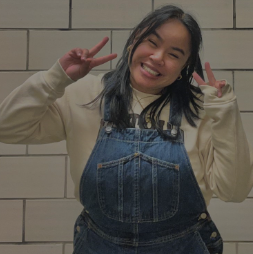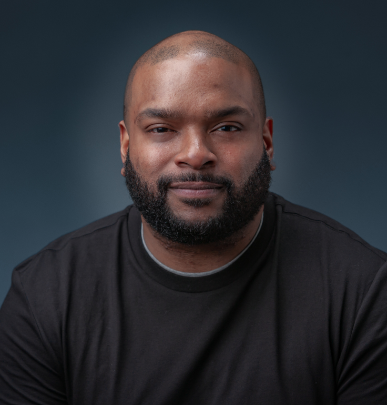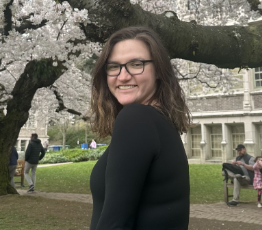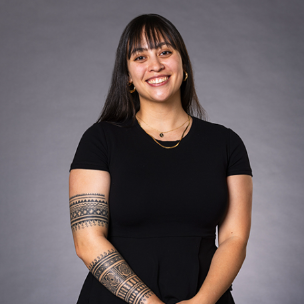Meet our M.Ed. Students
Are you curious what it’s like to be a part of the M.Ed. program at UW Bothell? We asked a few of our amazing students to give us insight into their experience, their goals for their degree, and advice for potential incoming students like you!
“I cannot emphasize enough how amazing and life changing this program has been. Thank you UWB!”
Antonia Dorn, M.Ed. ‘24
Janelle Tuble, M.Ed. ‘24
What about our program made you decide to pursue a Master of Education at UW Bothell? What concentration are you focused on for your M.Ed.?
The M.Ed. program at UW Bothell caught my eye because of the Critical Educational Change and Leadership concentration, which I am currently focusing on. The classes that this program offers align with what I want to focus on which is dedicating my time as an agent of change to work against inequity in all aspects of the education system.
What did you plan on doing/how do you plan on using your degree with your M.Ed. or post-graduation?

Initially, I aspired to become a school counselor and work within schools. However, after gaining extensive classroom experience and acquiring knowledge in my classes, I now aspire to obtain my teaching certification. My goal is to persist in creating a positive impact in classrooms and with students. I aim to incorporate the pedagogical strategies and insights gained from my coursework into classroom practice. I enjoy working in classrooms and creating relationships with students, so I have been looking at getting my teacher certification.
What is your favorite part about this program?
My favorite part about this program is getting to know the cohort through our projects and discussions. The people I am surrounded by are filled with love and support and the professors are OUTSTANDING! They try their best to support all their students and I always feel supported by them.
What’s one piece of advice you’d give incoming M.Ed. students?
Prioritize self-care and make time for activities that bring joy!
Brandon Washington, M.Ed. ‘24
What about our program made you decide to pursue a Master of Education at UW Bothell? What concentration are you focused on for your M.Ed.?
I was drawn to this program M.Ed. (Critical Educational Change and Leadership) because of the intriguing curriculum it presented. It was a blend of educational leadership practices rooted in a social justice framework. The content coupled with the amazing faculty members in this program inspired me to apply, and I’m tremendously thankful that I made that decision.
What did you plan on doing/how do you plan on using your degree with your M.Ed. or post-graduation?

I’m already applying my learning into my career! I serve as the Associate Director of Philanthropy at UW Bothell. My work is centered around connecting resources to impact in support of our campus. Through this program, I have reinforced critical lenses that help me navigate the challenging landscape of higher education. This program has amplified my leadership skill sets and frameworks and allowed me to implement critical lenses as I reflect on my work.
What is your favorite part about this program?
My favorite part on this program so far has absolutely been the community cohort model. We have really built a strong learning community comprised of both students and instructors. We have created space of critical pedagogy and share leadership to take place. These spaces have served as containers for constructive dialogue and community learning.
What’s one piece of advice you’d give incoming M.Ed. students?
One piece of advice I would offer incoming students is getting to know your faculty. I think this is an outstanding group of educators who are accessible and thoughtful. I would encourage folx to take time in connecting and do informational interviews to better understand not only the curriculum they are embarking on, but also the faculty who will lead you through it.
Andrea Schwandt, M.Ed. ‘24
What about our program made you decide to pursue a Master of Education at UW Bothell?
Coming from an undergraduate university that was on the medium side with a small class size, I was really looking for that same thing with my graduate degree. I find that when there is a smaller class size, you are able to make better connections with professors and your classmates!
What did you plan on doing/how do you plan on using your degree with your M.Ed. or post-graduation?
Right now, I work at Student Engagement & Activities to supervise Social Justice & Civic Education. For the next year or so, I will be working within Student Engagement & Activities, but as a club council co-advisor.

With this role, I will be implementing and changing policy for clubs on campus. I will take what I have learned in the CECL program and make sure there is equality and inclusion for the students on campus. Along with this, I will be applying to PhD programs to continue my education
What is your favorite part about this program?
About the program: The sense of connection between professor and student. There is never a time I didn’t feel supported or heard.
Cohort community learning: Knowing that everybody in the room supports one another. In a world where so many different things are happening, it’s nice to come to a place where we’re all striving for the same goal.
What’s one piece of advice you’d give incoming M.Ed. students?
Read the recommended readings, be as involved as you can, create friendships with your cohort, and always keep dreaming of something greater for the world of education.
Antonia Dorn, M.Ed. ‘24
What about our program made you decide to pursue a Master of Education at UW Bothell?
I took time off from school after I finished undergrad, working full-time and UW and a few part time jobs to find enough stability that I could perhaps find myself. I was looking on and off for a program that had elements of social justice and culture preservation focuses but cost and timing were the most important factors I had to consider. I floated more policy/administrative focused programs. Over the years of learning more about my own interests and passions, and after informational interviews/research on different programs, I found this program in passing conversation and it felt like a calling.

Knowing I could learn more about inequity in our education system and white supremacy’s impacts on all the structures we live in, I realized this opened a pathway for me to add to my knowledge bank and toolkit for how to invest in preserving culture and uplifting minoritized voices and communities.
What concentration are you focused on for your M.Ed.?
Critical Educational Change and Leadership (CECL)
What did you plan on doing/how do you plan on using your degree with your M.Ed. or post-graduation?
I have already accepted a new role in DEI work as the Manager of Inclusive Excellence Programs in the College of Engineering, Office of Inclusive Excellence at UW Seattle. Long-term, I feel excited about continuing to learn by engaging in dialogue and in books. I’m excited about finding more opportunities to be involved with my community with this better understanding of how to see and process the world around me.
What is your favorite part about this program?
The professors are my favorite part of this program. They create such a different classroom than I have ever experienced and inspire me to show up, dig deep into texts and thoughts, and challenge myself every day. They make school not feel like traditional “school” and so much more a privilege and opportunity to connect with others and our communities. The texts the professors have assigned are visionary, thought-provoking, honest, challenging, and just wonderful overall.
What is one piece of advice you’d give incoming M.Ed. students?
One piece of advice I would give incoming M.Ed. students would be to try your best to stay present. It can be easy to get lost in the flow of things or overwhelmed learning about all the inequity, white supremacy, and neoliberalism dominating our systems. The connections you make with others and between texts and lived experiences, the healing both alone and with others, can be stronger than the negative if you let it. You will be able to take so much more from this experience than you might expect.
Recognition Within the UW Community: M.Ed. student Antonia Dorn named a 2024 Husky 100 recipient!
From Antonia: I started my Husky Experience as a first generation, low-income Filipina-American student seeking to understand the world around me and finally find my roots. Through my undergraduate, professional and now graduate time at the UW, I have had the opportunity to learn extensively about my heritage, my community and the impact I can have in celebrating and healing in both. I am working to become the best advocate, educator and healer I can be to preserve cultures and histories like my own while uplifting the voices of our minoritized communities.
Learn more about Antonia and her time in the M.Ed. program at UW Bothell on UW Bothell News.
